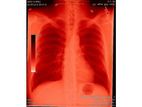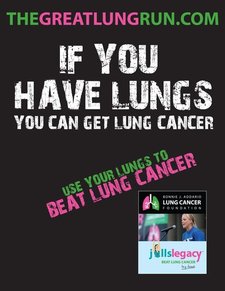|
In 2012, the National Cancer Institute will devote nearly $18,000 per death in research grants to breast cancer. They will devote under $1,500 per death to lung cancer.
0 Comments
 Lung cancer programs receive a fraction of the grants devoted to types that take fewer lives, data show. The stigma of smoking looms large. by Bridget Huber This article was originally published in The Orange Country Register on November 15th, 2012. Lung cancer takes more lives than any other cancer. This year it will kill an estimated 160,340 Americans – more than breast, colon and prostate cancers combined. While lung cancer remains largely a death sentence – just 15.9 percent of those diagnosed are alive five years later – the federal government funds far less research on the disease than on other common cancers. The discrepancy is starkest when death rates are taken into account. In 2011, the two federal agencies providing most of the research money funded breast cancer research at a rate of $21,641 per death while spending $1,489 per lung cancer death. It has been 41 years since President Richard Nixon signed the National Cancer Act, effectively declaring war on cancer. But there will be no victory without winning the battle against lung cancer, which causes more than one in four U.S. cancer deaths. Advocates say efforts to improve lung cancer patients' chances have been stalled by unexamined biases among health officials and the public as well as by scant research funds. They also cite the paradoxical invisibility of a disease that claims so many lives but has few champions of the sort who have brought breast cancer to national prominence. The stigma of smoking is largely to blame. Anti-tobacco campaigns have done their job too well, leading many to see lung cancer as self-inflicted. That stigma keeps some families and patients from speaking out, while corporate donors stay away from the disease, and some scientists and policymakers question whether scarce research dollars should be devoted to a smokers' illness. But an estimated 15 percent of lung cancers are diagnosed in people who never smoked. If lung cancer in these people was considered a separate disease, it would still be the sixth-leading cancer killer in the U.S., ahead of liver, ovarian and esophageal cancers. Researchers estimate that an additional roughly 50 percent of lung cancer cases involve former smokers who quit the habit years ago. "This is a public health problem that needs to be addressed regardless of how it came about," said Dr. David Carbone, a leading lung cancer researcher at Ohio State University. "We need to take care of those who are sick and need to do everything we can from a public policy perspective to reduce the number of people at risk in the future." Funding questions Recent breakthroughs in cancer genetics and lung cancer screening have added urgency to advocates' calls for more money for lung cancer research, which will get $231.2 million this year from the two main federal agencies funding such work. "We are at a precipice where we could really break through," said Kim Norris, president of the Lung Cancer Foundation of America. But these advances have come at a time when funding for all research is scarce. And many influential scientists balk at letting pressure from advocates influence research priorities. In their view, it could set the entire cancer research field back by creating a quota system for research on specific cancers that could divert funds from the most cutting-edge science. Carbone, however, says unless a portion of federal funds is specifically directed to lung cancer, advances in the field will remain baby steps. "We didn't send people to the moon because we happened to have a rocket ship sitting around. We sent people to the moon by saying, 'That's what we want to do.' And then we figured out how to do it." Making that moonshot will mean convincing the public and policymakers that lung cancer victims are worthy of support. Part of the challenge is that the disease is so deadly that there is no critical mass of survivors to raise its profile. Most people are diagnosed at an advanced stage and die within six months, said Jeffrey Borgia, a cancer researcher at Rush University Medical Center in Chicago. "There's not much time to fit a walkathon in," he said. In contrast, breast cancer advocates have raised millions through everything from road races to galas. The White House is lit pink each October for Breast Cancer Awareness Month. Pink ribbons have been attached to items including pistols and fried chicken buckets, becoming so ubiquitous that some question whether the cause has become too commercialized. Lung cancer groups, however, have struggled to attract attention. The original color for lung cancer ribbons was clear – as in, invisible. Perhaps the best example of how strong advocates can spur scientific research is the Defense Department's medical research program. In 1992, the National Breast Cancer Coalition, led by a breast cancer survivor and lawyer Fran Visco, persuaded the Defense Department to create a breast cancer research program funded by Congress. The resulting Congressionally Directed Medical Research Program has been allocated $2.8 billion for breast cancer research in the past two decades. But even though the armed forces skew heavily male and military members smoke at high rates (cigarettes once were included in soldiers' rations and have been sold at cut-rate prices on military bases), it was 17 years before the program began researching lung cancer in 2009. "It's really challenging now. There just isn't a champion," said Regina Vidaver, executive director of the National Lung Cancer Partnership. The stigma problem Before it can find its champion, lung cancer will have to shed its stigma. Last summer, advocates released an ad campaign aimed at shocking the public into examining its biases against people with lung cancer. Posters featuring a young man with geeky glasses and a plaid scarf began popping up across the country. "Hipsters deserve to die," they read. "Cat lovers deserve to die," read another. The point was provocation, said Kay Cofrancesco, a spokeswoman for the Lung Cancer Alliance, which sponsored the ads. When a person hears that an acquaintance has lung cancer, she said, a question immediately springs to mind: Did he or she smoke? The answer often is no. Yet the stigma persists, even though lung cancer among nonsmokers is rising, with women accounting for two-thirds of these diagnoses. One famous example is Dana Reeve, the singer-actress and widow of Christopher Reeve. A nonsmoker, Reeve was just beginning to emerge from the grief of losing her husband when she was diagnosed with stage 4 lung cancer at age 44. Yet blaming smokers who fell prey to cigarette marketing seems inconsistent – after all, society condemns tobacco companies for deceiving customers and even maximizing the addictiveness of cigarettes. We should "vilify the tobacco industry instead of vilifying patients," said Dr. Carolyn Dresler, an official with the Arkansas Public Health Department. Lung cancer can be caused by such factors as exposure to radon, asbestos and other toxins. About 10 percent of lung cancer deaths are linked to heredity, said Ann Schwartz, a researcher at Wayne State University in Detroit. Yet lung cancer's image as solely a smoker's disease can undercut support for research that looks at other causes, such as heredity. Changing the money Many lung cancer advocates and researchers have called for a reassessment of the way money is distributed at the country's largest funder of cancer research, the National Cancer Institute. Research grants from the NCI are the most important financing a cancer researcher can get. But the NCI's funding, allocated by Congress, has remained nearly flat since 2003, though it did get an additional $1.26 billion as part of the stimulus package of 2009. Congress does not dictate how much NCI can spend on each type of cancer. Instead, NCI funds the cutting-edge science most likely to move the entire field of cancer research forward. Lung cancer receives less funding than other cancers under this approach, too. In fiscal year 2012, the NCI will devote $221 million in research grants to lung cancer and $712 million to breast cancer, according to National Institutes of Health estimates. NCI officials caution against reading too much into these numbers. Most of the research it funds is basic research applicable to multiple types of cancer. The institute also funds tobacco control and financed the National Lung Screening Trial, a large, multiyear study that showed that screening smokers via low-dose CT scans reduces the number of lung cancer deaths. But some researchers, like Carbone, say the problem with the NCI's prerogative of funding the most advanced cancer research, regardless of what organ it involves, is that research on some types of cancer is further along than others. Breast cancer, for example, has been better funded for longer and had earlier breakthroughs that attracted more top researchers and more funding, from the federal government and other sources. "The infrastructure in the one disease is better than the other. It's a self-perpetuating problem," Carbone said. Cancer research is increasingly focused at the molecular level instead of at the organ level. Researchers now know that cancers at different sites in the body can be caused by some of the same genetic mutations. But a single mutation can behave differently in different organs, so it is still necessary to look at particular cancers such as lung cancer, Carbone said. The other side of the argument is represented by Dr. Harold Varmus, the NCI's director. He declined to be interviewed, but in a speech at the National Press Club in September, he said he would "object dramatically" to efforts such as legislation that would force the NCI to set aside specific pots of money for certain cancers. This approach, advocated by some groups over the years, would "take the decision-making about grant making out of the hands of the NCI and [put] it in the hands of advocacy groups," he said.  by By Lynne Eldridge MD This article was originally published at About.com on November 29th, 2012. As Lung Cancer Awareness Month draws to a close I'm glowing from hearing about all of the events - and how each year there are more and more advocates investing their precious time and energy to spread awareness and provide funding for lung cancer research. But amidst that glow is a sadness. It seems just when I get excited about a new organization or another medical institution promoting awareness, I read the second line. "The key to reducing lung cancer deaths is to launch more anti-smoking campaigns." Yes, those campaigns are important. But if we want to reduce lung cancer deaths, anti-smoking campaigns just aren't going to do it. Or even come close. I'm sure many of you are saying, what in the world is she talking about? A statistic may help:
Maybe a few numbers will make it even clearer. In 2008, the last year from which we have numbers available, there were 158,592 deaths from lung cancer in the United States, including 70,051 deaths in women. (Note that in the same year, there were 40,589 breast cancer deaths in women.) Using the 80% statistic, 126,874 of these deaths could not have been prevented by anti-smoking campaigns. So why are we focusing on anti-smoking campaigns? Why are we focusing our attention on only 20% of people who develop lung cancer? Don't get me wrong. This group of 20% who are current smokers deserve our love and attention just as much. But what about the other 80%? Since one of my pet peeves is listening to people rant who don't have a solution in mind, I'll offer a few. Perhaps we should be focusing more attention on other known causes of lung cancer. Radon is the second leading cause and is totally preventable. Checking for radon in your home doesn't even take willpower. Occupational exposures need more attention as well. And we need to focus more energy on treatment research. Even if we focus our efforts on the 20% with smoking cessation programs, many of those people will still develop lung cancer due to their history of smoking in the past. To do this we need funding. To get funding, lung cancer needs to recognized. Thanks to everyone who worked so hard to make this year's Lung Cancer Awareness Month more visible. Blessings to all of you. Sources:
Last year, as part of Lung Cancer Awareness Month, Stanford physicians got together to create and share a message of hope and educate the public about this devastating disease. Please take about four minutes to watch this video and share it with friends and family A heart-felt "Thank You" to the Stanford School of Medicine, Stanford Hospitals and Clinics, Liat Kobza, and Todd Holland for producing this EXCELLENT video.
10/23/2012 The Chick Running From New York to San Francisco @greatlungrun @jillslegacy @bonniejaddario #lungcancerRead NowOctober 23rd Update: Check out Kelcey on TV's "The Doctors" HERE. August 9th Update: Check out this video about Kelcey from Jill's Legacy.  ***The following article was written by Kelcey Harrison and published on The Huffington Post on July 31st, 2012.*** Kelcey is a native San Franciscan and is a major marathoner and lung cancer advocate. On July 30th 2012, after leaving her job at New York County’s District Attorney’s office, the 24 year old Harvard grad set out on her Great Lung Run – a 3,500-mile run from New York’s Times Square to downtown San Francisco. Harrison expects to arrive in November 2012 and will be blogging and tweeting her adventures until then.  Kelcey Harrison: I don't know if I am in denial, am extremely naive, or if I truly am confident that this is exactly what I am supposed to be doing right now, but for some reason the fact that I've started running 30 miles a day and won't stop until I reach San Francisco doesn't seem to stress or scare me. Maybe it's just that crazy people don't realize they're that crazy? I'm just your average 24-year-old who grew up in San Francisco, went to Harvard University, and moved to New York soon after college. For the last two years I worked at the New York County District Attorney's Office. Although I had the best time working there, I realized that law school was not really the route I wanted to take, and I was feeling a pull to make a change coupled with a very strong desire to contribute more to Jill's Legacy, I began thinking about some new options. This is where I break from the normal... The idea that I came up with was to run from New York to San Francisco to raise money and awareness for lung cancer. Lots of people asked, why? Couldn't I have done something a little less risky? But for me, it made perfect sense. I am using a skill that I have been blessed with -- running long-distance -- to make a difference and to draw people's attention to a topic that deserves greater discussion, awareness, and funding. I am doing something really big and out there, which was what Jill was all about. Jill and I first met when we attended kindergarten together. We went to school together from kindergarten through high school and remained good friends through college. While we were in school, there was a group of about five of us that was inseparable. She was a friend who was always there for me and had been in my life for so long that I always expected her to be around for life's big moments.  When she was diagnosed with lung cancer at just 21 years old, it was a huge shock. I certainly did not know how to handle it, but she did. She lived with more grace, determination, strength, and joy than most people will ever demonstrate in their lifetimes. After her diagnosis she did a lot of advocacy work with the Bonnie J. Addario Lung Cancer Foundation. In the last year of her life, Jill was named Pac-10 Women's Athlete of the Year, she graduated Cal Berkeley with a 4.0 and she led the Cal Women's crew team to a national championship. A few weeks after, Jill passed away. After her passing a group of young people with connections to Jill and/or the foundation formed Jill's Legacy, an advisory board to the foundation. Our goal is to mobilize young people to use their voices and power to raise awareness for lung cancer and to really start a movement to demand a change. Our goal is to debunk the stigma that faces lung cancer patients. The common belief that lung cancer is a smoker's disease or one that only affects older people is wrong. The first question people always ask in response to a diagnosis is, "Oh, you were a smoker?" The underlying message that comes across with this question is the idea that lung cancer patients somehow brought the disease upon themselves and so it is the last disease to get funding for research. This has to change. Nobody deserves to get cancer for any reason and, of equal importance no one deserves to get a disease for which there simply is not enough support. The survival rate for lung cancer has not changed in 40 years and that fact simply boggles my mind. With the technology we have today, there should be better options for early detection and treatment so that fewer lives will be lost. Why aren't people talking about this! For those of us who knew Jill, it drives us nuts. So, my journey has begun and I already have so much to share! Follow my Twitter account, as I will be Tweeting the wild adventures and characters I encounter along the way. I can't articulate how thankful I am for all of the support I have already received. I am already overwhelmed by the responses. We have raised over $100,000 since announcing the Great Lung Run just one month ago. I would be so appreciative of any support that readers can offer, whether that be in the form of a wave, a tweet or a penny. To support, visit www.thegreatlungrun.com, follow me on Twitter, or email me at [email protected].  Taylor Bell by Taylor Bell, Guest Blogger The following is in reference to my recent post, "The White House is "Pink". What about LUNG CANCER?" I just got a text from my godbrother who recently lost his grandmother to breast cancer, and I wanted to share it with y'all. Josh said, "Not sure if you meant it, but in your stuff about lung cancer being forgotten in the last few days, you come off as very... I don't know the best way to put it but the most polite is probably desensitized to breast cancer. I get what you are trying to get across but others might not. It seems very close to, '$@#& breast cancer - that's not even the worst one!!' Just thought I would let you know so you don't alienate a potential proponent for awareness because they get turned off." I hope you guys don't feel that way. Here is my response: "I'm sorry if it comes across that way; anyone who knows me that I support all types of cancer! I work in cancer care and give every breathing second to cancer in some way. You know, I actually admire what the breast cancer movement has done over the past 40 years by increasing survival rates to nearly 98%. But what is unfair is the desensitizing attitude that the general public has done to lung cancer patients. I will shut up when people stop asking me if I smoked to get lung cancer. Until then, it's freedom of speech and everyone who I care about knows my heart and intentions and that I support all types of cancer, including breast cancer." After thinking about it and talking with my sister, I think the honest truth is that I am extremely jealous of what the breast cancer community has been able to do. I am jealous of their survival rates, their funding, the lack of stigma. I am jealous of what their PR campaigns have been able to do. And I hope to one day get lung cancer there.
So, for anyone's feelings that I hurt or if I came across harsh or uncaring - for that I am very sorry. I hope everyone knows and understands my heart. They know that I chose to go into cancer care to make a difference for all cancer patients. No cancer is better or more important than one cancer or the other. I do believe, though, that it is my duty and obligation as one of the 15% to speak up on behalf of everyone who isn't able to speak up.  Taylor Bell by Taylor Bell, Guest Blogger The White House is “Pink” this month, but what will they do for Lung Cancer Awareness in November? NOTHING I’M SURE. Do people even know that November is Lung Cancer awareness month? Unfortunately, I doubt it. Sad. Pathetic. Hurtful. Shameful. Stigmatized. Unrecognized. Underfunded. Unimportant to Most. Why? Because everyone thinks that in order to get Lung Cancer you have to smoke, and because you smoke you somehow deserve lung cancer. NO ONE deserves cancer of any kind. Not all smokers get lung cancer and not all lung cancer patients are smokers. Actually 60% of the newly diagnosed are NEVER smokers or former smokers who quit decades ago. ALL cancers deserve the same recognition and awareness that breast cancer gets. We as a society do a disservice to the general public by hyping up breast cancer as much as we do and ignoring all of the other cancers that effect EVERYONE, specifically lung cancer. I’ve said it before but I am going to say it again. Lung Cancer is the NUMBER ONE cancer killer of MEN AND WOMEN in this nation. It kills more people than breast, prostate, colon and pancreatic cancers combined. It is the least funded of all major cancers and the stagnant 15.5% survival rate has remained unchanged for 40 years. 160,000 people will pass away from lung cancer this year alone in the US. For those of you who don’t know, there is one person who is doing everything humanly possible to raise awareness for this disease. Kelcey Harrison is running across the UNITED STATES. Who can say they have done that? I would be surprised if anyone can say they have accomplished that task. 30-40 miles a day for 18 weeks straight….. What more could a person do to bring awareness to this horrible horrible cancer?! There is NOTHING more she could do. She is giving EVERYTHING possible.  ABC News Photo So, why hasn’t the national news media picked up this story? Who knows? Is it because of the stigma? Is it because it’s not the “pretty pink cancer”? Is it because Lung Cancer doesn’t matter to most people? I mean, the girl is RUNNING ACROSS THE UNITED STATES. Why isn’t the TODAY Show, Good Morning America, Ellen, Oprah, Brian Williams, Rock Center begging her to be on their telecast? STIGMA. PERIOD. That’s right folks, we have stigmatized this disease for so long that we have made everyone think that ONLY smokers get lung cancer and that they deserve it and therefore, Lung Cancer isn’t important. Lung Cancer happens to people from all walks of life, Moms, Dads, Grandparents, Aunts, Uncles, Children, Siblings, Sorority Sisters, Division I College Athletes, NEVER SMOKERS, NFL Wives, Famous Singers and Actors, the list goes on. From the great words of Katie Couric “It’s time to put the blame game aside, and figure out what is really going on.” Please join me in trying to bring much needed awareness to Lung Cancer and bringing publicity to the one person who can say they have given everything humanly possible to raise awareness for this dreaded disease. Please follow @greatlungrun on Twitter or visit her website and fundraising page at www.thegreatlungrun.com and www.Crowdrise.com/thegreatlungrun.
9/27/2012 The State of Georgia Releases the First Lung Cancer Awareness Specialty License Plates in the CountryRead Now Tina Pink Proceeds to benefit the Joan Gaeta Lung Cancer Fund and their efforts to support research and awareness. Atlanta, GA (PRWEB) September 27, 2012 // On Monday, September 24th, the state of Georgia released the first specialty license plate in the country specifically dedicated to lung cancer awareness. Now drivers can alert fellow motorists that, in Georgia, lung cancer matters! The plates are now available exclusively through The Joan Gaeta Lung Cancer Fund. Georgia drivers can learn more and begin the process of getting theirs at http://www.LungCancerLicensePlate.org. The license plate is sponsored by The Joan Gaeta Lung Cancer Fund, a non-profit based in Atlanta that raises awareness and research funds for the number one cancer killer in the world. The process to create specialty license plates in Georgia typically takes nearly two years. The state requires either 1,000 plates to be presold or an up-front payment to be made to cover the fees for those plates. Through The Joan Gaeta Lung Cancer Fund's fundraising efforts and the incredible generosity of their supporters, the Gaeta Fund was able to make the payment needed and to the get the bill before the legislature in a matter of months. State Senator Sean Jerguson (R-Holly Springs) was instrumental in adding the lung cancer awareness language to an existing bill (HB 732). He was alerted to this important cause by his close friend and Gaeta Fund supporter, Jackie Archer. A lung cancer survivor herself, Mrs. Archer is also a former Holly Springs City Councilwoman. In April of this year, Georgia Governor Nathan Deal signed HB 732 into law. "My mother, Joan Gaeta, died of lung cancer after a three-and-a-half year battle," says Tina Pink, a VP of Fundraising for the Gaeta Fund. "She was most passionate about raising awareness and fighting the stigma of the disease. This plate is a big step in that direction. I know she would be very proud! Now it's our mission to get them on as many cars as possible!" Mrs. Pink's sister, Theresa Andretta, VP of Operations, concurs. "Lung cancer kills more people than the next five cancers combined! Yet, it receives the least amount of funding. We have no choice but to raise awareness and to fight the stigma. These plates are a great way to do that. It is incredible to finally see them on the road!" The $25 plate manufacturing fee, payable to The Joan Gaeta Lung Cancer Fund, helps them support ground-breaking research through the Addario Lung Cancer Medical Institute. ABOUT THE JOAN GAETA LUNG CANCER FUND The Joan Gaeta Lung Cancer Fund was created in the fall of 2007 as The Joan Gaeta Lung Cancer Foundation by her husband and children to raise awareness of the disease, to educate the public, and to be an advocate for research. They also strive to eliminate the stigma of lung cancer and to support survivors and their loved ones in their local community. In July of 2010, they re-launched as The Joan Gaeta Lung Cancer Fund benefiting the Addario Lung Cancer Medical Institute. Their ultimate goal remains the same: “to eradicate lung cancer.” By partnering with one significant research initiative, they can make a much greater impact in wiping out lung cancer. http://www.forjoan.org ABOUT THE ADDARIO LUNG CANCER MEDICAL INSTITUTE (ALCMI) ALCMI was established in 2008 as a 501(c) (3) non-profit organization with the ultimate goal of significantly impacting survival by directly catalyzing and accelerating discovery of new and more effective treatment options for all lung cancer patients. Presently, ALCMI has 13 academic and community medical centers in the United States and Europe closely collaborating on cutting edge research initiatives. http://www.alcmi.net ABOUT LUNG CANCER
5/17/2012 Donna Summer: #LungCancer Leading Cause of #Cancer Death @bonniejaddario @joegaeta @teamdraftRead Now By Eryn Brown Orginally publshed by the Los Angeles Times on May 17, 2012, 3:16 p.m. Disco legend Donna Summer, 63, died Wednesday night, reportedly of lung cancer. As of press time, her family hadn’t released details about her illness, so it was unknown what type of lung cancer she had, and how long she may have been ailing. According to the American Cancer Society, lung cancer is the leading cause of cancer death in both women and men, killing more than 150,000 people per year -- more than colon, breast, ovarian and prostate cancers combined. In 2012, the group estimates, there will be about 226,000 new cases of lung cancer in the U.S. Survival rates of people with lung cancer are low. Only about half of people diagnosed with early-stage non-small-cell lung cancer (the more common type) survive five years or more after diagnosis; many lung cancer cases aren't discovered until late in the disease's progression, however, because symptoms often don't arise until the disease is advanced. The risk of developing lung cancer increases with age, but it’s not unheard of for relatively young people to die from the disease. Joe Paterno died of lung cancer at 85; Peter Jennings at 67; Christopher Reeve's widow, Dana, at 44. According to some news reports, Summer hoped to keep her medical condition under wraps. The reasons why are unknown -- but according to Rachel Schwartz, a spokeswoman for the Lung Cancer Foundation of America, it’s not unusual for people with lung cancer to feel ashamed of having the disease, because it is so closely associated with a negative behavior: smoking. "Many famous people who have lung cancer never disclose this fact, which speaks to the huge stigma of this disease," Schwartz wrote in an email. "The stigma of the disease is crushing and any announcement of a lung cancer diagnosis is often accompanied by an assumption that you somehow brought the disease upon yourself." Smoking is the leading risk factor for lung cancer, causing about 90% of the cases, according to the U.S. Centers for Disease Control and Prevention. But about 60% of new lung cancer patients either never smoked or haven’t smoked for many years, Schwartz said. Reeve was a non-smoker; Jennings a 20-year former smoker who admitted to relapses here and there. Second-hand smoke is a known carcinogen. A Web search did not reveal if Summer smoked. News outlets reported Thursday that she believed she developed lung cancer after breathing in dangerous particles in the air in the aftermath of New York's Sept. 11 attacks. Copyright © 2012, Los Angeles Times 5/9/2012 Woman w/ #lungcancer aims to end #stigma associated w/ the disease by getting on @TheEllenShowRead NowThis article was originally published on www.ksby.com on May 9th, 2012.  by Carina Corral A Lompoc resident has terminal lung cancer, even though she never smoked a day in her life. Now, Mary Anne Rios now aims to end the stigma associated with lung cancer and her mission involves Ellen DeGeneres. She has a lot of fond memories of her family, friends and years as a counselor at Lompoc High School. She would like one of her last to be of dancing on the Ellen Show. "I can't find anybody to support lung cancer because there's such a stigma on it.. She's so tolerant and accepting of so many people that maybe she would do this." An on-line petition has been started to get Mary Anne on the Ellen Show. In just a short time, it has collected thousands of signatures. "I just don't want anyone else to go what I went through, misdiagnosed, because my story is not unique." Mary Anne is not a smoker and no one in her family is, so she said doctors never thought her chronic cough, hoarseness, and a lump in the back of her neck could be lung cancer. They were wrong. "The biggest problem with lung cancer is that it's the least funded and the number one killer.. I've had to tell so many medical personnel about the symptoms of lung cancer and I shouldn't be the ones telling them they should be telling me." It went untreated for so long, it spread to her brain and spine. Doctors don't give her much longer to live. "I call it my bucket wish list because of the movie The Bucket List." Mary Anne has checked many things off her list that include meeting Kurt Russell and going to Disneyland with her family. "I want to ride in a limo bus, a dancing one with my friends, and I want to make it to my birthday and dance with my husband," Mary Anne said of the items on her list that remain unchecked. Dancing with Ellen also tops the list. She wants it to be a fun way to spread her important message, "that anyone with lungs can get lung cancer." Mary Anne is trying to raise money and awareness for lung cancer research. On her own, she has already raised $20,000 by organizing walks and vigils in Lompoc. Click here to sign the online petition to get Mary Anne on the Ellen Degeneres show. © 2012 KSBY.com |
Details
|


 RSS Feed
RSS Feed
